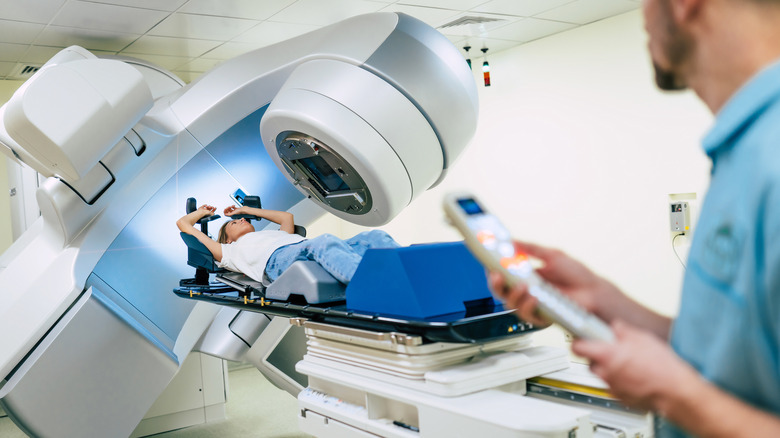How Is Stomach Cancer Treated?
At its most basic definition, cancer is a disease where the cells of the body grow uncontrollably without restraint and spread to different parts of the body, according to the National Cancer Institute. Cell division is a normal part of not just human biology, but of all living things. However, cancer is different, growing and multiplying when it's not needed. Cancer can also develop in almost any part of the body, like the lungs.
Thankfully, stomach cancer is not a common form of the disease, according to the National Cancer Institute. It's reported that stomach cancer accounts for 1.4% of all new cancers in the United States each year. In 2022, there were more than 26,000 new cases of stomach cancer which led to just over 11,000 deaths, explains the American Cancer Society.
Your doctor will diagnose and detect stomach cancer usually in two ways: looking inside the stomach and taking a tissue sample, according to Mayo Clinic. The treatment of stomach cancer depends on various factors.
Treatment depends on the cancer's location and stage
There are a variety of treatment options for stomach cancer, depending on the location in the stomach and the stage of cancer. Most cancers are diagnosed in one of four stages, explains Cleveland Clinic.
- Stage I, where the cancer is contained in a small area and hasn't yet spread.
- Stage II, where the cancer is larger but has not spread.
- Stage III, where the cancer is even larger and has potentially spread to other parts of the body.
- Stage IV, also known as advanced cancer, where the cancer has definitely spread to other parts of the body.
For stomach cancers, your doctor may suggest surgery. This can involve removing parts of the stomach, cutting away small cancers from the lining of the stomach, and even removing the entirety of the stomach, according to Mayo Clinic.
There is also chemotherapy, a treatment where drugs containing certain chemicals are used to kill cancer cells (per Cleveland Clinic). Chemotherapy is usually provided for stage II and stage III cancers, not stage I.
There are other types of treatment as well, such as immunotherapy where the body's immune system is boosted with medicine to fight the cancer, explains the American Cancer Society.
Also, radiation therapy can be used to kill cancer cells after surgery or if the cancer is advanced. It uses high-powered beams of X-rays, protons, or other sources to kill and shrink the cancer (via Mayo Clinic).
Some of these treatments may even be combined for more effective treatment.


